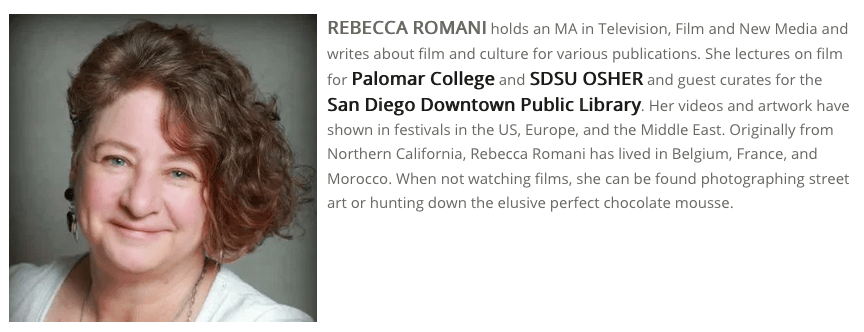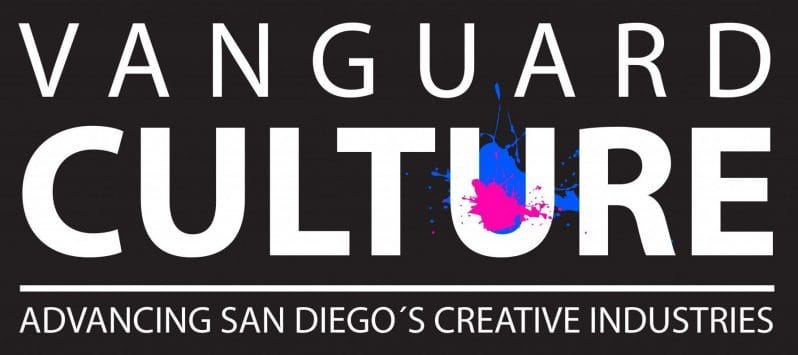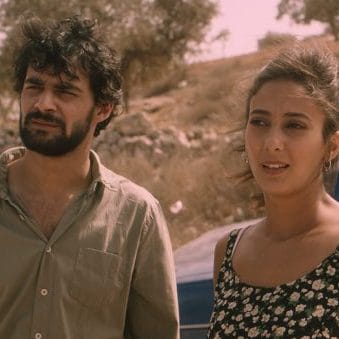By Rebecca Romani
June 18, 2021
Oscar Contenders and promising first features dominate the 10th annual San Diego Arab Film Festival (SDAFF) as it continues its major feature programming through June 19. The films come from all over the Arab World, from Morocco in the west to Palestine in the east as well as from Sudan. The films present a more nuanced view of cultures in the Arab world and in the Arab Diaspora, most notably from France and the US.
This year, viewers will experience the features on the big screen at the Museum of Photographic Arts in Balboa Park while the shorts programs remain accessible online until June 19th.’
The features take a wide look at life and culture in what is often referred to as the MENA region- the Middle East and North Africa, offering views of daily life and concerns frequently absent from reporting or American fiction films set in the region. Everything from coming of age in diaspora (Honey Cigar) to a black comedic critique of traditional practices and religion (The Unknown Saint) to the conflict between ISIS (Daesh in Arabic) and music in Syria (Broken Keys) are showcased here.
Palestinian film is also amply represented in this year’s SDAFF. The films are especially timely, considering the present situation in the West Bank. The film Between Heaven and Earth directed by Najwa Najjar opened the festival Saturday, June 5. Najjar did a Q&A session both screenings over zoom. Another Palestinian film, 200 Meters, closes the festival Saturday, June 19.
Capsule reviews:
Open and Closing Films
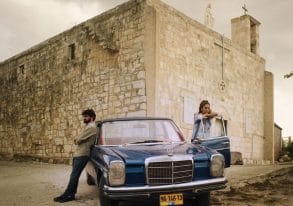
Between Heaven and Earth, 2019
Directed by Najwa Najjar
Palestine
Arabic, Hebrew, and English, with subtitles
Screened Saturday, June 5
Between Heaven and Earth is a beautiful film, full of both tender and terrifying moments all shot in gorgeous, understated color and close framing. The film follows a young Palestinian couple, Nazareth-born Salma and Beirut-born Tamer, whose marriage is coming unraveled. To file for divorce, Tamer must get a three-day pass to cross the checkpoints at the Green Line (the wall separating the occupied territories from Israel), to appear in the courts in Nazareth. Once there, family secrets come spilling out- Tamer, the son of an assassinated Palestinian leader is shocked to find out his father had an affair with an Iraqi Jewish woman, and that he and Salma have only 72 hours to find his father’s lover to procure the documents they need for the divorce.
Along the way, Tamer and Salma will learn about the price of state betrayal (the theft of hundreds of Arab Jewish babies by the State in 1949), the loss of family, of country, and ultimately, of themselves. Mouna Hawa is exquisite as Salma, who struggles to slip her marriage bonds even as she still loves and cares for her husband. Firas Nasser as Tamer is both fiercely charming and compassionately tender as a man whose childhood included watching his father get assassinated and his adulthood spent trying to fill the that left. Heaven and Earth lays bare the difficulties of living in Gaza while at the same time, exploring the complicated themes of fighting for Palestine and the difficult integration Mizrahi (Arab) Jews faced when they arrived.
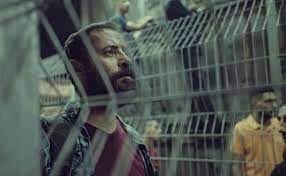
200 Meters, 2020
Directed by Ameen Nayfeh
Palestine
In Arabic, Hebrew, and English with subtitles
Screens June 19 at 8:45 p.m.
This year’s festival is book-ended by another Palestinian film that looks at the hurdles Palestinians encounter every day as they negotiate living in the margins of Palestinian and Israeli identity. Mustafa (Ali Suliman) lives on one side of the green line (the line that divides Gaza from the rest of Israel) while his wife, Salwa (Lana Zreik), and three children, all Israeli Arabs, live on the Israeli side less than 300 meters away. To see his family and work as a laborer, Mustafa must have a valid pass. Things come to a head when Mustafa needs to cross over to take care of his son Majd who has been hit by a car and finds he can’t because his permit has expired. Now desperate, Mostafa has to figure out how to cross without getting arrested. How he does is both illuminating and terrifying.
200 Meters is both warmly charming and a bit of a nail biter. Ali Suliman brings nuanced depth and an aching decency as a family man who is deeply devoted to his family but cannot bring himself to bend to Israel’s identity rules. His interactions with his wife Salwa (finely drawn by Zreik) and children (the nightly signaling with lights while talking on the cellphone is brilliant) have a sweetness that underscores the risks he is willing to take when he engages a smuggler to take him across. The film is most raw when Mustafa has to manage a smuggling gone terribly wrong just to make it to the other side. Elin Kirschfink’s sensitively-lensed camerawork, balances a deeply felt intimacy with harsh reality is a portrait of daily life lived under occupation.
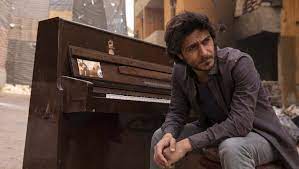
Broken Keys, 2019
Directed by Jimmy Keyrouz
Lebanon
Arabic with English subtitles
Screens Friday, June 18, 7:30 p.m.
Broken Keys is both director Jimmy Keyrouz’s debut feature film and Lebanon’s entry for Best Foreign Film for the 2021 Oscars. Inspired by a real-life ban on music declared by ISIS (Daesh), Keyrouz sets his tautly directed story in Al-Sekka, Syria, circa 2014, as ISIS starts to rampage through the country. Karim (Tarek Yaacoub in a subtle portrayal) is an accomplished pianist who dreams of playing with a European orchestra. Trapped in ISIS-occupied Al-Sekka, he raises his neighbors’ spirits through his music in defiance of the ban that ISIS has imposed. However, at the same time, Karim is planning his escape, hoping to sell his beloved piano to finance his flight. But Karim experiences an unexpected setback when an ISIS snitch tells the group about the piano, and Karim’s dreams appear to be as shot up as the instrument. Karim has one last chance to repair the piano, but will he find the parts?
Keyrouz uses Karim’s journey in search of another piano to provide both a message of hope and an ominous portrait of what happens when religious extremists wreak havoc on Syria’s small towns and cultural sites. Much of the film has a quasi-documentary look as well-known cinematographer Joe Saade slips the camera in and around the recently destroyed city of Mosul in Iraq and Al-Sekka, poignant reminders of cities under vicious siege. Yaacoub is subtle and intense as Karim while the cast is a who’s who of talented Lebanese actors. The film is also beautifully scored by Gabriel Yared, who won an Oscar for The English Patient and a nomination for Cold Mountain.
Screening 6/19 (closing night)
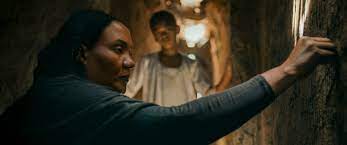
You Will Die At 20, 2019
Directed by Amjad Abu Alalla
Sudan
Arabic with English subtitles
Screens June 19, 6:15 p.m.
Think of Sudan, and you are more likely to think of Sudan’s complicated troubled politics than its long history of filmmaking. The 1989 military coup led by Omar Al-Bashir ushered in a religiously conservative Islamic government that effectively killed Sudan’s cinema as well as suppressing much of Sudan’s cultural traditions. But after Al-Bashir and his government were overthrown in 2019, Sudan’s cinema industry began to rise from neglect and disrepair. Amjad Abi Allah’s luminous film, You Will Die At 20 is one the latest offerings from the newly reconstituted Sudanese film industry. Beautifully-lensed and deftly directed, the film explores the idea of religious prophecy and its effect on a Sudanese village. During baby Muzamil’s naming ceremony, a religious Sheikh predicts that the boy, Sakina’s only child, will die by the time he’s 20. Unable to handle the prediction, the child’s father, Alnour (a powerful turn by Talal Afifi), leaves for Khartoum, only to send promises and sometimes money back in letters while Sakina (beautifully played by the luminous Islam Mubarak) is left to raise the boy alone.
When Muzamil (brilliant work by Mustafa Shehata) is able to slip his mother’s watchful gaze, he discovers a whole world, including a girl, Naiema (Bonna Khalid) who draws him into love and a mentor, Suleiman (Mahmoud Elsaraj in a masterful mix of jaded awareness and compassion) who challenges him to live. What happens on the fateful day Muzamil turns 20 may surprise you.
Past Screenings:
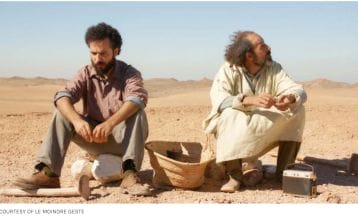
The Unknown Saint, 2019
Directed by Alaa Eddine Aljem
Morocco
This film is a rare gem with its understated, very Moroccan sense of humor and wry take on the connection between traditional faith and flous (money) in Moroccan society. The story follows a thief (the excellent Younes Bouab), on the run from the cops, who stashes his loot on a hill in the desert outside Marrakech. To make sure no one touches it, he disguises it as a grave with the traditional head and foot stones. The thief returns years later, after a long prison term, to dig up his take, only to find a kouba, or traditional Moroccan domed building often housing a saint’s tomb, has been built over it and dedicated to an unknown saint and the miracles he has supposedly performed.
Not only is the kouba there, but a small town has sprung up around it with a barber who functions as a dentist (the drole Ahmed Yarziz). A fresh-faced new doctor from the city (the expressive Anas El Baz) soon becomes the secular object of devotion by the ladies of the village who flock to him for pills for anything that ails them.
Determined to retrieve the money, the thief joins forces with his former partner (in a finely crafted performance by Salah Bensalah), only to be thwarted by the various rites performed for the faithful and the guard of the shrine (the versatile Abdelghani Kitab) and his dog. Aljem gives the story one last quirky twist when the money is finally recovered.
Aljem, who wrote the film as well, sets his story in the spare, dramatic landscape of the deserts outside of Marrakech. The cinematography here is spare, beautiful, and bathed in the filtered light typical of the region. This is Aljem’s first feature. His gently satirical look at tradition and modernity, combined with thoughtful, sincere performances from acting professionals and amateurs, suggests that Aljem is a new talent to keep an eye on.

Honey Cigar, 2019
Directed by Kamir Ainouz
France, Algeria
In Arabic, Kabyle (Tamazight from around Algiers), French
Honey Cigar represents work by Diaspora filmmakers, in this case, Kamir Ainouz, an Algerian (Kabyle)-French director, who draws on her own experiences of coming of age in Paris in the 90’s. Honey Cigar follows the ins and out of 17-year-old Selma’s life as she negotiates the landscape of her new prestigious school, the looming civil war in Algeria, the mores of her new classmates, and her growing awareness of her sexuality. As the daughter of comfortably middle-class Algerian immigrants, Selma (luminous Zoe Adjani, niece of Isabelle Adjani) tries to balance her identity as a French-born Algerian with her identity as a French student in an elite school (“I am not unique, I am double”). Her parents are grappling with Selma’s ever more complicated life and walking a fine line between permissiveness and keeping Selma within the bounds of Kabyle respectability.
It’s an interesting debut with stellar actors in Lyes Sliman as Selma’s secular Kabyle father who worries about her and Amira Casar as her tightly wound secular mother who worries about Selma’s marriage prospects even as she worries about Selma’s studies.
However, Ainouz subjects her cast to storylines that drip with stereotype and cliches. Selma’s parents are hyper aware of their Kabyle background and the militant violence in the name of Islam and an Arabicized national identity that is menacing Berbers and non-Berbers alike back in Algeria- and yet seem fixated on their daughter’s social purity, even going so far as to set up meetings with potential mates. Selma, meanwhile, is teetering between self-awareness and trying to shed an imposed identity as charming if not quite up to snuff outsider at her new school. She predictably acts out, allowing herself to be debased by those whose attention she craves (the hazing scene is misogynist and cringe worthy) and lightly fetishized by her French boyfriend. The rape by one of her parents’ proposed suitors nearly sends her over the edge, while her parents worry about her reputation.
Ainouz also seems to set up an equivalency between Selma’s parents’ close attention to her life and the beliefs of the Islamic Salvation Front (the FIS), that by 1993, was slaughtering whole villages, and executing Amazigh writers and musicians for the crime of not being Arab. And this is just the beginning of a civil war (1991-2002) that saw hundreds of thousands of Algerian civilians die after a military coup negated the FIS’ electoral victory in the first rounds of elections. This equivalency is particularly offensive in light of the fact that by 1992, the FS was kidnapping Algerian school girls, forcing them into temporary marriages, and then killing them, abandoning their bodies in front of their schools as a message that girls need not be educated in a secular school. Ainouz cannot possibly have not been aware of this since the Algerian civil war was well-covered in the French and Algerian press. Ainouz’s attempt at equating Selma’s parents’ concerns with the actions of the FIS comes off as playing to the cheap seats and wildly tone deaf.
If there is a redeeming moment, it comes during a visit to Kabylie (rarely seen in films by French Algerians), where Selma visits her grandmother and learns about her mother’s professional sacrifices (leaving her practice in Algeria for life in France), so that her daughter could have a life with greater potential.
Ainouz is well-served by an excellent cast and brilliant cinematographer. What a shame they are not as well-served by her. This film carries a content warning for explicit sexual situations and language.

